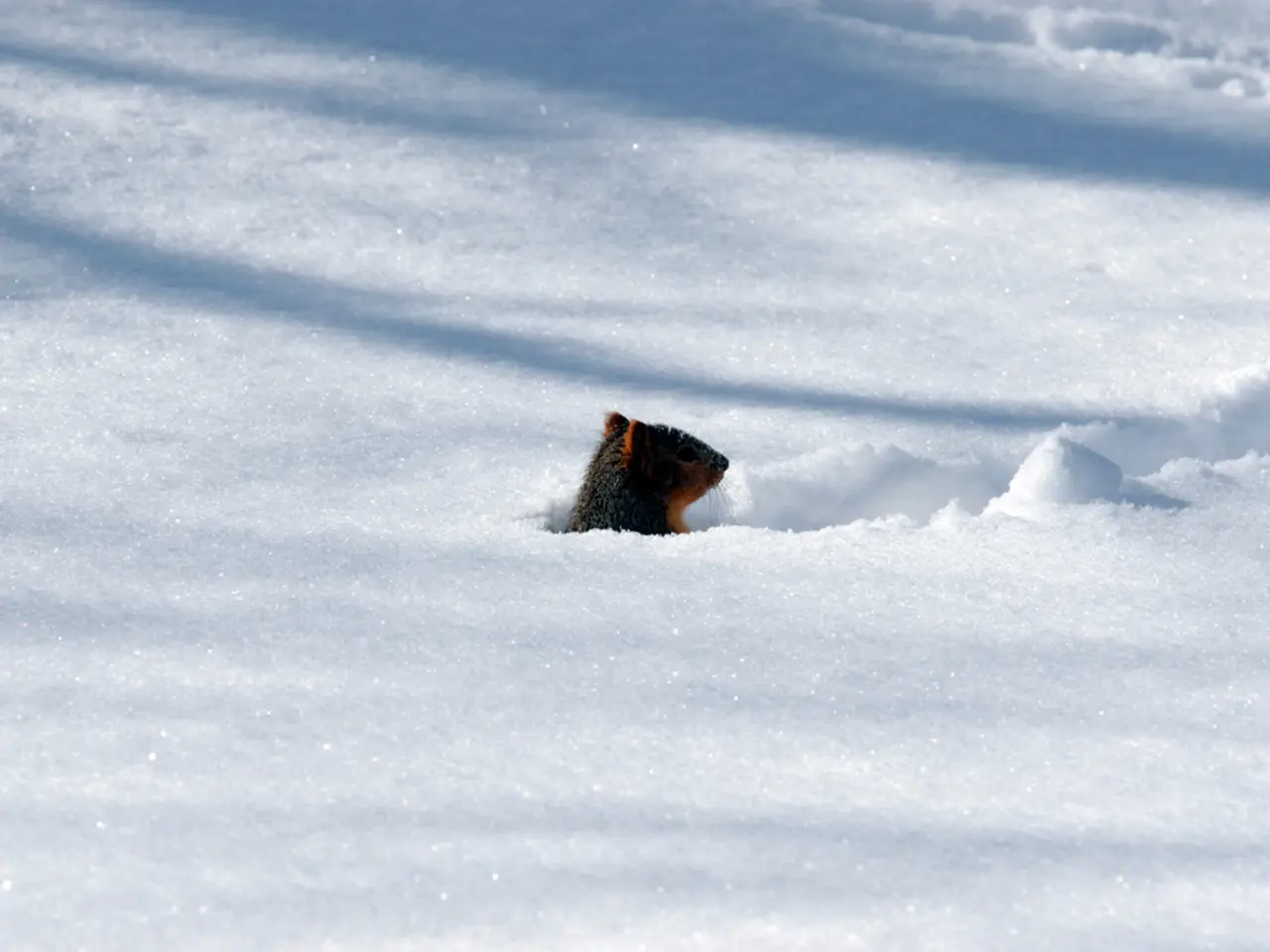Controlling Snow Buildup in Sustainable Gardening Strategies for Frigid Regions
Urban Permaculture Embraces Winter Challenges with Snow Management Techniques
In the realm of urban gardening, managing snow is no longer just a matter of shoveling and salting. With permaculture, snow is transformed into a valuable resource, serving as a natural mulch and water source, and insulation layer that improves soil health and extends the growing season.
Permaculture designers employ a variety of strategies to optimise snow management, turning winter challenges into benefits.
Creating Microclimates for Year-round Growth
Structures like cold frames and raised beds are used to capture solar heat and protect winter greens and perennials from harsh weather. This allows crops like mustard greens, collards, and asparagus to grow over a longer period, even under snow or frost cover.
Mulching to Retain Moisture and Encourage Microbial Activity
Thick layers of straw or leaf mulch beneath winter crops protect soil from erosion and temperature extremes, support moisture retention, and foster beneficial fungi like wine cap mushrooms that improve nutrient cycling in cold, moist environments.
Cover Crops and Living Mulches for Soil Protection
Growing winter-hardy cover crops or winter-kill crops such as oats or peas before planting main crops creates a protective organic layer that decomposes into nutrient-rich mulch, builds organic matter, and prevents soil compaction from freeze-thaw cycles.
Soil Amendments for Microbial Diversity and Soil Resilience
Adding biochar, compost teas, inoculated compost, and rock dust supports soil microbial diversity and structure, helping soils resist compaction and retain fertility under snow.
Designing for Solar Access and Snow Management
Orienting planting rows and tree placement to maximise sun exposure accelerates snowmelt and warms soil microclimates, extending growing conditions in urban settings.
In addition to these strategies, urban permaculture also addresses snow management challenges with rooftop gardens and balcony spaces, vertical gardening, and small-scale season extension methods. Rooftop gardens provide insulation, thermal regulation, and year-round food production. Vertical gardening techniques maximise limited urban space for growing cold-hardy crops.
As winter approaches, key seasonal preparations include adding compost and mulching with straw or leaves, setting up season extension structures like low tunnels, and crop rotation and succession planting to maintain soil health.
With these permaculture approaches, winter challenges are turned into opportunities, enhancing soil moisture, protecting soil structure, fostering beneficial microbes, and enabling cold-season crop production that improves soil health and extends the urban garden growing season.
[1] Permaculture Research Institute
[2] The Permaculture Institute
[3] Cold Climate Permaculture
[4] The Urban Permaculture Guild
[5] The Permaculture Way
- The Permaculture Research Institute advocates for transforming snow into a valuable resource in urban gardening.
- Winter greens and perennials can grow for longer periods with the use of cold frames and raised beds, capturing solar heat and protecting crops from harsh weather.
- Solar heat-capturing structures like cold frames and raised beds allow crops like mustard greens, collards, and asparagus to grow under snow or frost cover.
- Mulching with straw or leaf layers beneath winter crops protects soil from erosion, temperature extremes, and supports moisture retention.
- Thick layers of straw or leaf mulch foster beneficial fungi like wine cap mushrooms that improve nutrient cycling in cold, moist environments.
- Winter-hardy cover crops or winter-kill crops like oats or peas protect soil from freeze-thaw cycles and decompose into nutrient-rich mulch.
- Biochar, compost teas, inoculated compost, and rock dust support soil microbial diversity and structure, helping soils resist compaction and retain fertility under snow.
- Oriented planting rows and tree placement to maximize sun exposure accelerates snowmelt and warms soil microclimates.
- Rooftop gardens provide insulation, thermal regulation, and year-round food production in urban settings.
- Vertical gardening techniques maximize limited urban space for growing cold-hardy crops.
- Key seasonal preparations include adding compost and mulching with straw or leaves before winter.
- During winter, setting up season extension structures like low tunnels can help protect crops from harsh weather.
- Crop rotation and succession planting maintain soil health during winter.
- The Urban Permaculture Guild explores winter-gardening strategies in a cold climate.
- Compost management and composting at home, a part of industry, reduce waste and contribute to better soil health and nutrient cycling.
- Medical-conditions like chronic diseases and cancer can benefit from good nutrition, fitness, and mental health, boosted by adopting a permaculture lifestyle.
- Nutrition plays a significant role in managing respiratory conditions, digestive health, eye-health, hearing, and skin-care.
- Medications, therapies, and treatments for various health-and-wellness concerns can influence weight-management, cardiovascular-health, and sleep.
- Fitness-and-exercise, mental-health, and stress management are essential factors for men's health and women's health.
- Financial management, banking, and insurance are critical aspects of workplace-wellness and overall health-and-wellness.
- Neurological-disorders can benefit from alternative therapies like CBD oil, environmental-science research, and medical guidance.
- Entrepreneurship can offer opportunities in the skincare and wellness industry, addressing various skin-conditions and aging.
- The finance industry can explore sustainable practices and investments in environmental-science and climate-change initiatives.
- Energy-efficient practices in the manufacturing industry can contribute to reducing environmental impact and climate-change mitigation.
- Collaborative community efforts and support networks address challenges in small-business, leadership, and caring for aging parents.
- The space-and-astronomy sector can inspire innovation in retail, transportation, and energy, fostering a sustainable future for generations to come.




